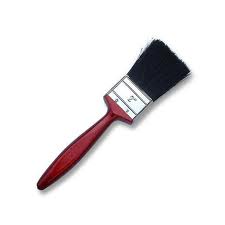brush
英 [brʌʃ]
美 [brʌʃ]
- n. 刷子;画笔;毛笔;争吵;与某人有效冲突;灌木丛地带;矮树丛;狐狸尾巴
- vt. 刷;画;
- vi. 刷;擦过;掠过;(经过时)轻触
使用频率:

记忆方法
1. 小布什(Bush)拿花做画笔. brush my hair 梳头.
2. 从灌木丛(bush)中采集一束花儿来做刷子(brush)。
2. 从灌木丛(bush)中采集一束花儿来做刷子(brush)。
中文词源
brush 刷子
词源同bristle, 刺毛,broom, 金雀花,扫帚。指用灌木枝扎的刷子。
英语词源
- brush
-
brush: [14] It is not clear whether brush for sweeping and brush as in brushwood are the same word, although both appeared in the language at about the same time, from a French source. Brush ‘broken branches’ comes from brousse, the Anglo-Norman version of Old French broce, which goes back to an unrecorded Vulgar Latin *bruscia. Brush for sweeping, on the other hand, comes from Old French broisse or brosse.
It is tempting to conclude that this is a variant of Old French broce, particularly in view of the plausible semantic link that brushwood (cut twigs, etc) bundled together and tied to a handle makes a serviceable brush (that is how broom came to mean ‘brush’). The verb brush ‘move fast or heedlessly’ comes from Old French brosser ‘dash through undergrowth’, a derivative of broce; its frequent modern connotation of ‘touching in passing’ comes from the other brush.
- brush (v.1)
- late 15c., "to clean or rub (clothing) with a brush," also (mid-15c.) "to beat with a brush," from brush (n.1). Related: Brushed; brushing. To brush off someone or something, "rebuff, dismiss," is from 1941.
- brush (n.1)
- "dust-sweeper, a brush for sweeping," late 14c., also, c. 1400, "brushwood, brushes;" from Old French broisse (Modern French brosse) "a brush" (13c.), perhaps from Vulgar Latin *bruscia "a bunch of new shoots" (used to sweep away dust), perhaps from Proto-Germanic *bruskaz "underbrush."
- brush (n.2)
- "shrubbery," early 14c., from Anglo-French bruce "brushwood," Old North French broche, Old French broce "bush, thicket, undergrowth" (12c., Modern French brosse), from Gallo-Roman *brocia, perhaps from *brucus "heather," or possibly from the same source as brush (n.1).
- brush (v.2)
- "move briskly" especially past or against something or someone, 1670s, from earlier sense (c. 1400) "to hasten, rush," probably from brush (n.2), on the notion of a horse, etc., passing through dense undergrowth (compare Old French brosser "travel (through woods)," and Middle English noun brush "charge, onslaught, encounter," mid-14c.), but brush (n.1) probably has contributed something to it as well. Related: Brushed; brushing.
权威例句
- 1. I rounded a bend where the trees and brush grew thickly.
- 我绕过一个林木茂盛的弯。
- 2. When it's dry, brush the hair using a soft, nylon baby brush.
- 当头发干后,用柔软的婴儿用尼龙发刷梳理头发。
- 3. Brush your teeth after each meal and floss daily.
- 餐后要刷牙,而且每天要使用牙线清洁牙缝。
- 4. The corporation is fighting to survive its second brush with bankruptcy.
- 公司正在努力摆脱自身遭遇的第二次破产危机。
- 5. I ran the brush through my hair and dashed out.
- 我用刷子刷了一下头发,冲了出去。
